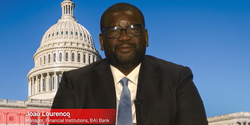
Open Banking: Still The Next Big Thing
As open banking expands, consumers and companies stand to enjoy lower fees, greater ability to leverage their financial data: if they can control the risk of stolen or misused data.

On 30 November, the 2023 UN Climate Change Conference begins in Dubai. With COP28 taking place in the United Arab Emirates, just one year after COP27 in Egypt, the concerns of developing economies will be at the forefront of the global climate agenda.

Dr. Adaeze Udensi, Managing Director of Nigeria’s Titan Trust Bank, speaks with Global Finance’s Founder and Editorial Director Joseph Giarraputo about the outlook for Nigeria’s economy and how the economic trends effected Titan Trust Bank’s strategy and performance, and how ...

Foreign exchange trading is, like other investments, susceptible to the volatility that can plague us all in uncertain times. And the past few years have seen more uncertainty than most.

Kuwait’s leading banking innovator, Boubyan Bank is transforming corporate banking with a fully digital one-stop corporate platform. Abdul-Salam Mohammed Al-Saleh, Chief Executive Officer, Boubyan Bank’s Corporate Banking, Financial Control, Treasury and Legal Affair, discusses the bank’s corporate banking strategy, market opportunities in transactional, trade and supply chain banking and commitment to serving as a digital transformation partner to corporates.

Bank of China has integrated green development throughout its operations – from management and business development to financial products and services – with the goal of helping China achieve peak carbon emissions and carbon neutrality goals.

Following the historic COP27 in Sharm El-Sheikh, Dr Dalia Abdel Kader, CIB Egypt’s Chief Sustainability Officer, discusses significant outcomes that raise the bar for COP28 in Dubai.

To stay competitive and relevant amid shifting business and operational models, large corporates must leverage digitalisation and automation to be nimbler and more responsive, says Joseph Lee, Group Head, Treasury and Working Capital Advisory & Solutioning at DBS.

Corporate treasurers are increasingly assuming the mantle of sustainability as their organisations look to adopt and implement ESG policies and practices. They have a unique opportunity to contribute to positive social and environmental impact.

Mudassir Amray, CEO and Managing Director of Nigeria’s Union Bank, speaks with Global Finance’s Founder and Editorial Director Joseph Giarraputo about the role of SMEs in Nigeria’s economy growth, the challenges facing SMEs, and how Union Bank is supporting the ...

With roots reaching back over 100 years, AMEN Bank is among Tunisia’s most successful and dynamic banks today. Néji Ghandri, Chairman of the Board of Directors, Amen Bank, explains how the bank has sustained its strong position over many decades and continues to bring market-leading innovation in Tunisia’s financial sector.

In turbulent times, those who stay still are destined to be left behind. And the past few years have been among the most turbulent in living memory, with Covid-19, climate change and war in Ukraine all having a significant impact.

As the 2022 FIFA World Cup kicks off in Qatar, Joseph Abraham, Group CEO of Commercial Bank of Qatar (CBQ) met with Global Finance to discuss the significant challenges of providing safe and convenient digital banking services for the World Cup and how digital banking is moving Qatar to a cashless economy.

Vietnam’s banking industry is evolving rapidly driven by a digital transformation that is making everyday banking simple, easy, and convenient for customers across the country. Being at the forefront of this change offers huge potential for growth, says Pranav Seth, Chief Digital Officer at Techcombank.

Africa offers a huge opportunity for positive climate change action and sustainability if done sensibly and collectively. The continent has experienced significant losses and damages attributable to climate change, including drought, biodiversity loss, lower food production, weaker economic growth, and loss of lives. These impacts will exacerbate if global warming is above target but limiting global warming to 1.5°C or below would significantly reduce damages to African economies, agriculture, health, and ecosystems. The African population is heavily exposed to climate impacted sectors with over one-half of the workforce employed in agriculture.

African governments are developing ambitious adaptation policies aligned with society development goals, and an enabling environment for finance and investment. There has been an increase in framework and climate change laws across Africa, including in Kenya, Egypt, Nigeria, Benin, Uganda and South Africa.

Banks have a vital role in supporting the global transition of the economy to net-zero emissions. Banks stress the need for institutional capacity development, along with regulatory and other policy reforms, to support and accelerate climate finance from domestic and external sources, both public and private, for climate resilience in Africa.

A full-service bank with over US$6 billion in net assets, 1.8 million customers, nearly 500 distribution channels throughout the country, and a rapidly growing digital banking platform, BAI (Banco Angolano de Investimentos) has emerged as a strong and secure national and international banking partner in Angola. BAI was selected by Global Finance as the Best Bank in Angola in 2022.

A leading provider of Sharia-compliant financial solutions in Egypt, ADIB Egypt spearheaded the country’s launch of Sukuk issuance, promising to increase Islamic banking and stimulate economic growth. Mohammed Aly, CEO of ADIB Egypt, discusses the bank’s role in Egypt’s approval of sovereign Sukuk issuance and the anticipated benefits for Sukuk issuers, market liquidity & sustainable finance.

Digital banking and customisation is rapidly expanding Awash Bank’s markets for banking services among Ethiopia’s SMEs and underbanked retail customers. Henock Tessema, Chief, Retail & SME Banking Officer, Awash Bank, Ethiopia, discusses how the bank’s strategy to foster entrepreneurship, close the SME financing gap, and bank the unbanked is supporting Ethiopia’s economic growth.

Since the financial crash of 2008, the changing economic environment has presented companies in all sectors with problems to overcome. Brexit, the Covid pandemic and war in Ukraine have exacerbated these problems. In such times, liquidity is vital. Orbian’s Supply Chain Finance solutions go far beyond those available elsewhere in the market and address the most pressing needs of corporations around the world.